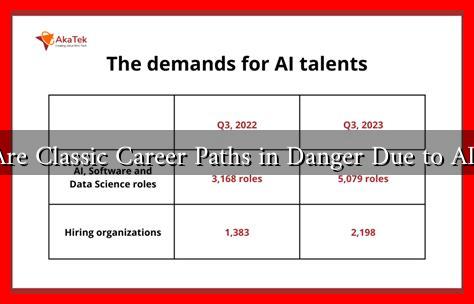-
Table of Contents
Are Classic Career Paths in Danger Due to AI?
As artificial intelligence (AI) continues to evolve and integrate into various sectors, the question arises: Are traditional career paths at risk? The rapid advancement of AI technologies has led to significant changes in the job market, prompting both concern and curiosity about the future of work. This article explores the impact of AI on classic career paths, examining which jobs are most at risk, the potential for job transformation, and the skills that will be essential in the AI-driven economy.
The Rise of AI and Its Implications for Employment
AI technologies, including machine learning, natural language processing, and robotics, are increasingly capable of performing tasks that were once the exclusive domain of humans. According to a report by McKinsey, up to 800 million jobs worldwide could be displaced by automation by 2030. This statistic underscores the urgency of understanding how AI is reshaping the workforce.
Jobs at Risk: Which Classic Career Paths Are Most Vulnerable?
While AI has the potential to create new job opportunities, it also poses a significant threat to certain traditional roles. Here are some classic career paths that are particularly vulnerable:
- Manufacturing and Assembly Line Jobs: Automation has already transformed manufacturing, with robots taking over repetitive tasks. For instance, companies like Tesla and Amazon utilize AI-driven robots to enhance efficiency.
- Customer Service: AI chatbots and virtual assistants are increasingly handling customer inquiries, reducing the need for human customer service representatives. A study by Gartner predicts that by 2025, 75% of customer interactions will be managed by AI.
- Data Entry and Administrative Roles: AI can process and analyze data faster than humans, making data entry jobs less relevant. Tools like Microsoft Excel now incorporate AI features that automate data analysis.
- Transportation and Delivery: The rise of autonomous vehicles threatens jobs in trucking and delivery services. Companies like Waymo and Uber are investing heavily in self-driving technology.
Transforming Careers: The Silver Lining of AI
While some jobs may be at risk, AI also offers opportunities for career transformation. Many roles will evolve rather than disappear, requiring workers to adapt and acquire new skills. Here are some ways AI is transforming careers:
- Augmented Roles: AI can enhance human capabilities. For example, doctors can use AI for diagnostic assistance, allowing them to focus on patient care rather than administrative tasks.
- New Job Creation: As AI technologies develop, new roles will emerge. Positions in AI ethics, data analysis, and machine learning engineering are already in demand.
- Reskilling and Upskilling: Workers will need to embrace lifelong learning. Online platforms like Coursera and Udacity offer courses in AI and data science, enabling professionals to stay relevant.
Essential Skills for the AI-Driven Economy
To thrive in an AI-dominated job market, individuals must cultivate specific skills that complement AI technologies. These include:
- Technical Skills: Proficiency in programming languages such as Python and R, as well as understanding machine learning algorithms, will be crucial.
- Soft Skills: Emotional intelligence, creativity, and critical thinking will set individuals apart, as these are areas where AI cannot easily compete.
- Data Literacy: The ability to interpret and analyze data will be essential across various industries, as data-driven decision-making becomes the norm.
Conclusion: Navigating the Future of Work
The rise of AI presents both challenges and opportunities for classic career paths. While certain jobs may be at risk, many roles will evolve, requiring workers to adapt and acquire new skills. Embracing lifelong learning and focusing on both technical and soft skills will be essential for navigating the future of work. As we move forward, it is crucial for individuals, educational institutions, and organizations to collaborate in preparing for an AI-driven economy. By doing so, we can ensure that the workforce is equipped to thrive in a rapidly changing landscape.
For more insights on the impact of AI on employment, you can visit McKinsey’s Future of Work page.

